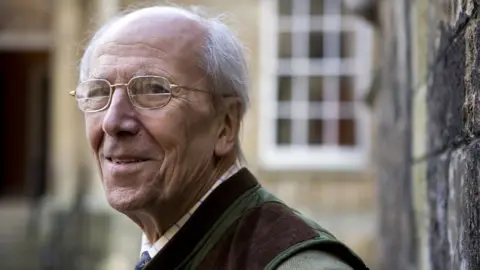Norman Tebbit, a prominent figure on the Conservative political right, has passed away at the age of 94. His life and work were closely tied to the political revolution under Margaret Thatcher in the 1980s. Tebbit was deeply rooted in a philosophy of self-reliance, which formed the foundation of his political beliefs. Known as an articulate and diligent politician, his candid discussions on immigration and Europe resonated with the Conservative base, leading many to see him as a potential leader of the party.
Throughout his political career, Lord Tebbit’s uncompromising stance on various issues garnered him both ardent supporters and detractors. Despite the often unflattering names his political opponents called him, he remained steadfast in his views, earning a reputation as one of the staunch voices of the Thatcher government. His contributions were significant, and his legacy as a pioneer of modern Conservatism is enduring.
Born on March 29, 1931, in Ponders End, a working-class suburb of north London, Tebbit faced economic hardship early in life. His father, once a manager in a jewellery business, lost his job during the economic depression and took up work as a painter—as a result, the family frequently moved between temporary accommodations. This background profoundly influenced Tebbit’s outlook on life and shaped his drive for economic independence.
His academic pursuits led him to Edmonton County Grammar School, where he cultivated an interest in Conservative politics. This passion was evident when he stated, “I felt you should be able to make your own fortune. You should be master of your own fate.” After leaving school at 16, Tebbit worked for the Financial Times, although he faced obstacles related to union membership. He later fulfilled his National Service in the Royal Air Force, reaching the rank of Pilot Officer before pivoting to a career in advertising.
Despite his career as a pilot with British Overseas Airways Corporation (BOAC), Tebbit was drawn into politics after the Labour government came to power in 1964. He ran as the Conservative candidate for Epping, a seat historically associated with Sir Winston Churchill, and campaigned on a platform advocating for privatisation and reform of trade unions. His vigorous campaigning led him to victory in the 1970 general elections.
However, Tebbit quickly grew disillusioned with the leadership of Ted Heath, feeling that the party’s original radical platform was being overshadowed by a more moderate consensus approach. Despite his dissatisfaction, he accepted a position as parliamentary private secretary under the minister of state for employment, which he later resigned from due to conflicts over the government’s economic policies.
As an MP, Tebbit gained notoriety for his fiery rhetoric and willingness to challenge the government. His position grew stronger when the Conservatives regained power in 1979, as he was appointed under secretary at the Department of Trade and, later, Secretary of State for Employment. It was during this time that he made his memorable speech advocating for personal responsibility, using his father’s experience during the Great Depression as a backdrop. His assertion that the unemployed should “get on their bikes” and seek work ignited significant controversy.
Tebbit’s tenure also included formidable challenges, such as navigating the complexities of trade unions and industrial relations amidst national turmoil, including violent riots and growing unemployment. His implementation of the Employment Act in 1982 marked a pivotal moment in his career, aiming to curtail trade union powers.
The Brighton bombing in 1984, which targeted a Conservative Party conference, profoundly affected Tebbit. He survived, but his wife, Margaret, suffered severe injuries that left her in a wheelchair, altering their lives dramatically.
After the electoral triumph of 1987, Tebbit shifted to party chairman, spearheading revitalisation efforts. Despite subsequent controversies and criticisms of his stark views on immigration and multiculturalism, he remained an influential voice, especially in advocating for a hardline stance on European integration, which some viewed as a precursor to Brexit sentiments.
Tebbit’s commitment to his values persisted throughout his life. Following his wife’s death in 2020, he continued to voice his opinions on key political matters, even challenging the Conservative Party’s direction under new leadership. His legacy, characterised by his unrelenting advocacy for self-reliance and traditional Conservative values, shaped the landscape of British politics, leaving behind a contentious yet impactful testament to the power of ideology in government. In summary, Lord Norman Tebbit’s life journey represents an era of British political history, illustrating the complexities of governance and the fervent debates that shaped modern Conservative philosophy.











